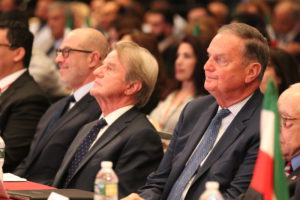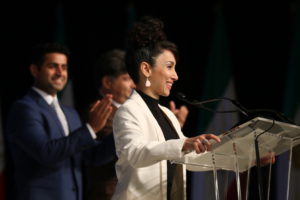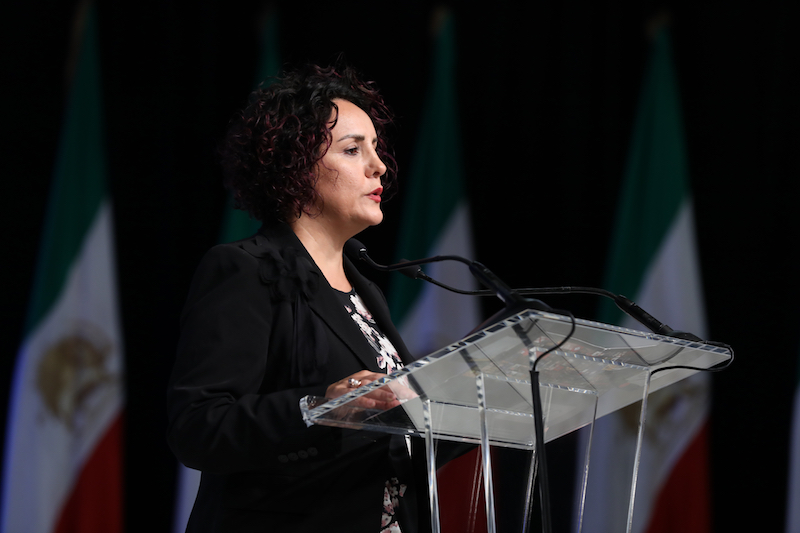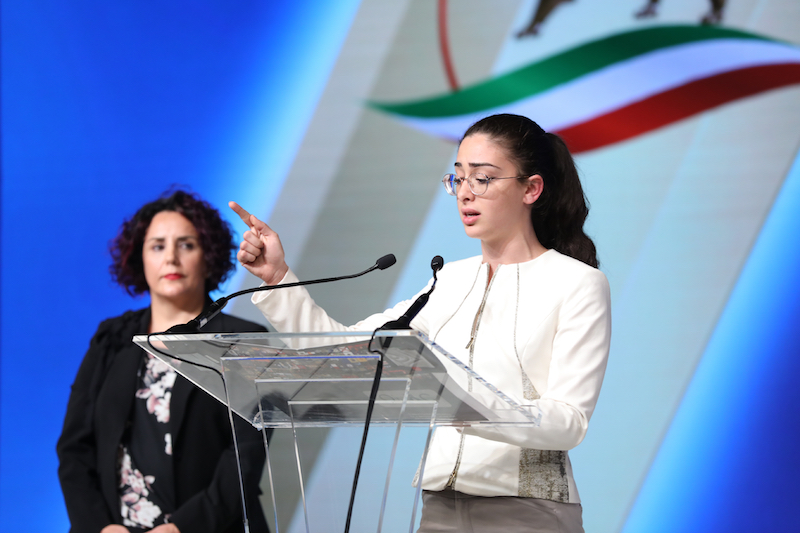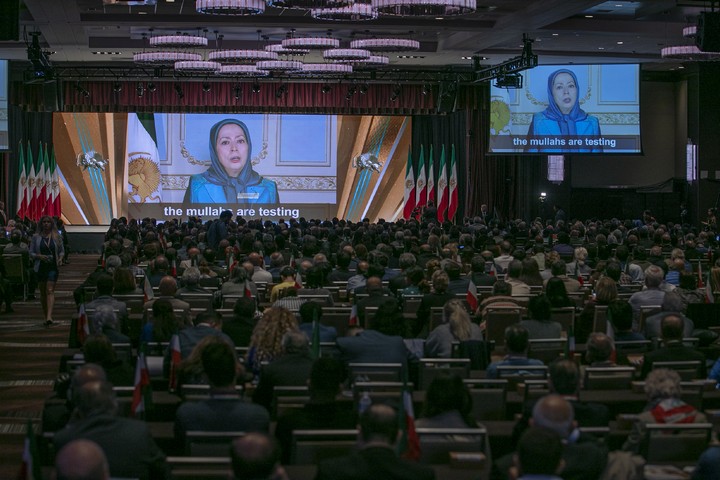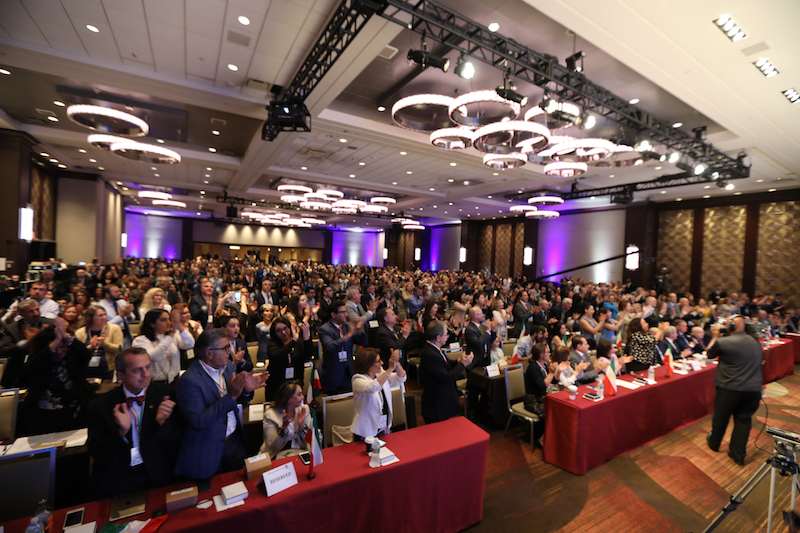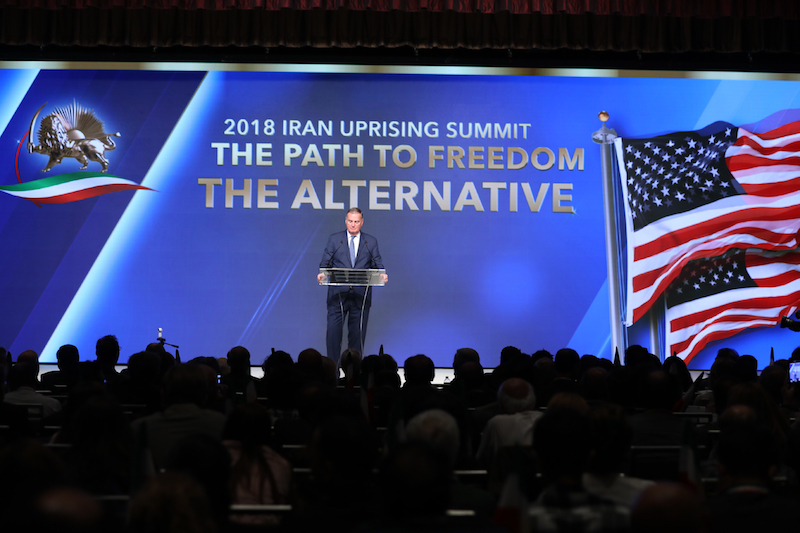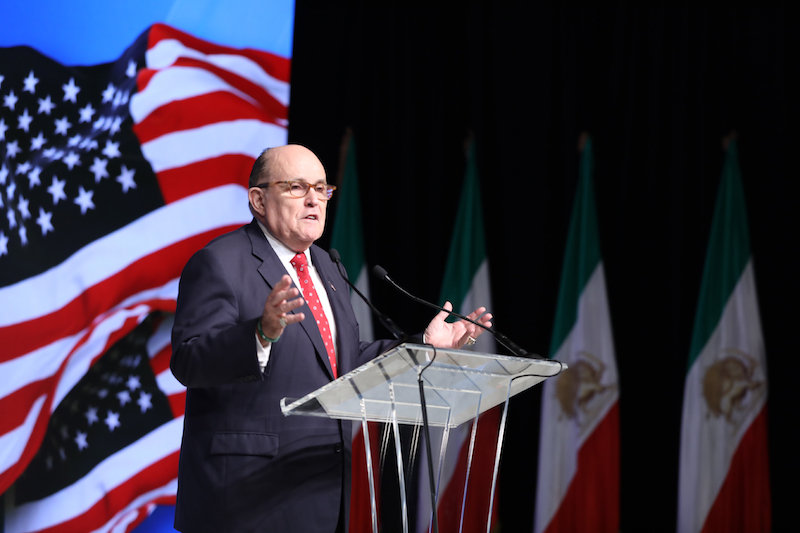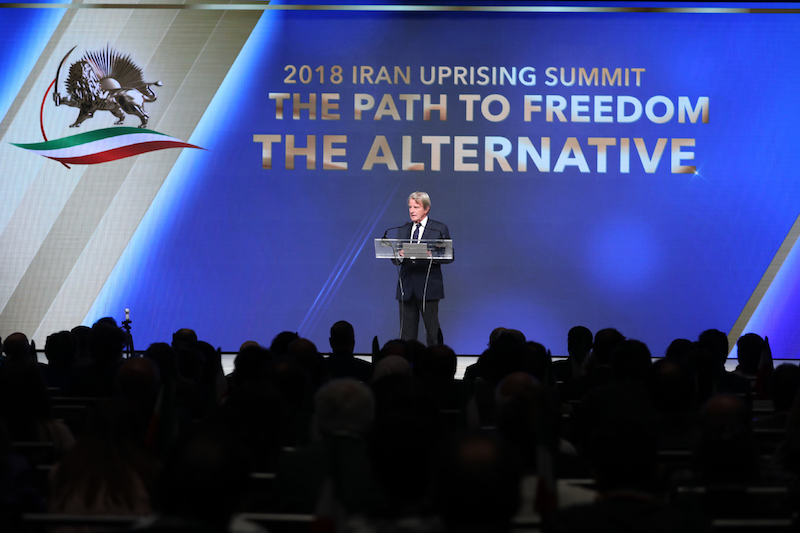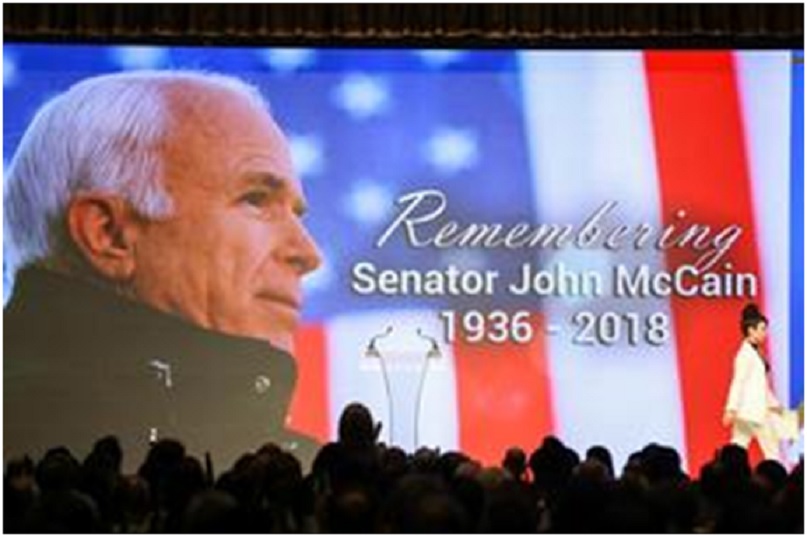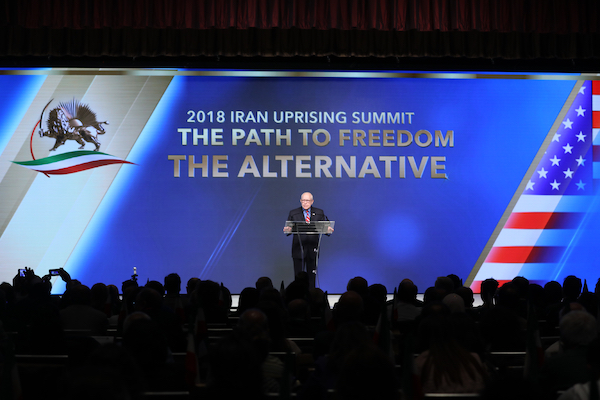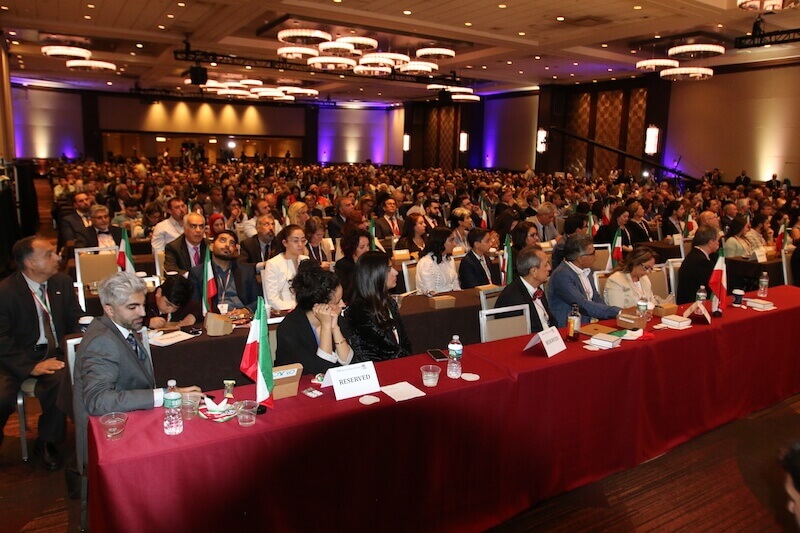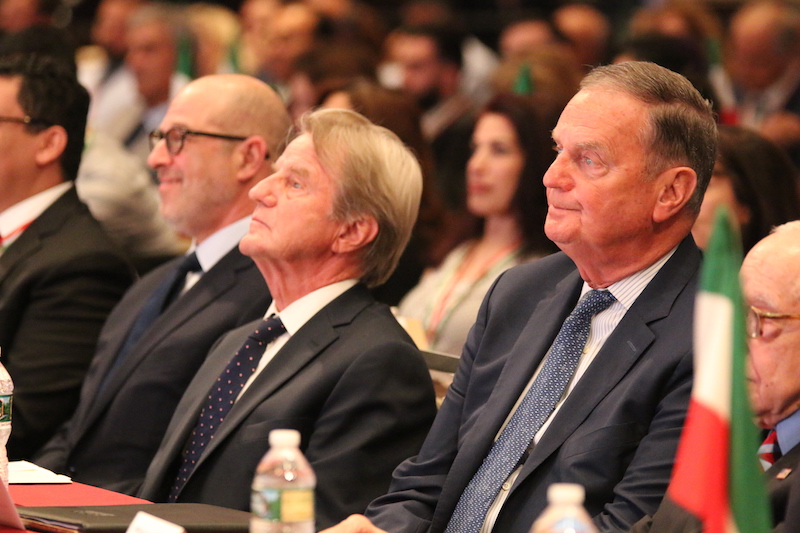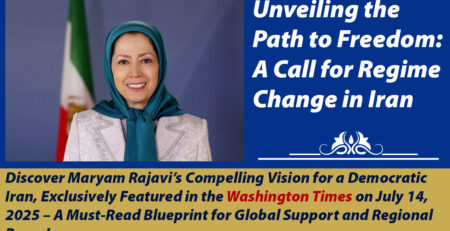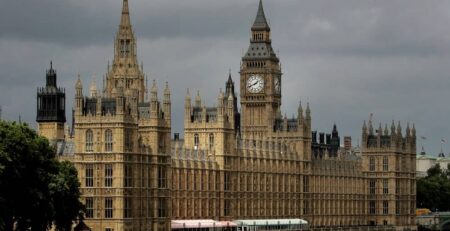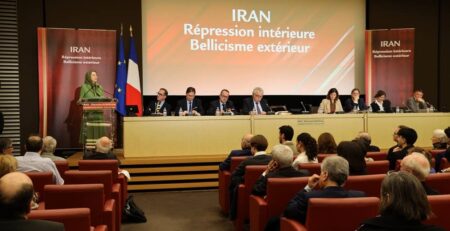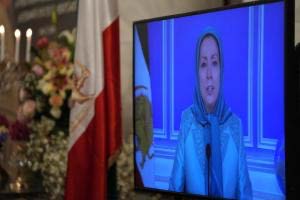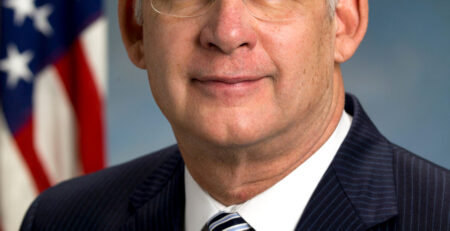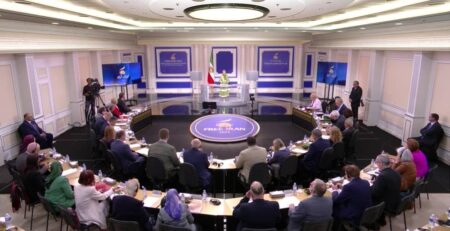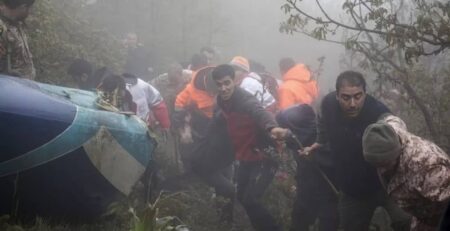Iran Uprising – The Path to Freedom The Alternative New York Sheraton; September 22, 2018
On Saturday, more than 1,500 leaders and delegates of the Iranian American Community from 40 states participated in the “Iran Uprising – The Path to Freedom” summit.
Among the prominent speakers at this event was former New York Mayor Rudy Giuliani, who was joined by former National Security Advisor General James Jones, former Attorney General Michael Mukasey, former French Foreign Minister Bernard Kuschner, and former Italian Ambassador to the U.S. Giulio Terzi.
The delegates called for a free, secular, non-nuclear, and democratic Iranian republic. The summit agenda and its keynote speakers suggested that a failure by Western governments to confront the Iranian regime and its terror network would only intensify the regime’s suppression of the Iranian people as enable its terrorist actions abroad.
Remarks by Ms. Shekoofeh Sharifi on behalf of OIAC
At the beginning, Ms. Shekofeh Sharifi welcomed all in the full hall, and focused her message on the role of Iranian women in leading the protests. Bellow is her full transcript of her speech.
Ladies and gentlemen, it is a great honor to be with you today.
As we gather today in the Iran uprising summit, it is very important that we also acknowledge the equality movement when it comes to the ongoing protests in Iran. In every protest, in every confrontation with the regime’s security forces, in every street corner as people gather to start their protest, we can see the active presence of women. We can see women of all ages, young, old, mothers, daughters and sisters, they are leading and influencing the course of events during these protests.
Female political prisoners continue to be a source of inspiration with their resistance inside of Iran’s prisons. The suppressive regime has acknowledged that 28% of those arrested in the recent protests are women and young girls.
Activists like Saha Mortezaie and Maryam Mohammadi who were arrested during the December 2017 uprising, have been sentenced to 6 and 7 years of prison respectively.
Let us not forget the women’s call for change of this regime did not begin in the recent uprising. It began almost four decades ago when they said no to the regime’s terror at home, misogyny, violence, corruption, and institutionalized violence.
Iranian women have paid the heaviest prices for freedom. Their basic human rights, economic rights and social and civil rights is under constant attacks by this regime. It is no wonder that the effective opposition against the regime ruling Tehran is led by a woman; Mrs. Maryam Rajavi. It is no wonder that she inspires all of us with her vision for equality and freedom. It is no wonder that we see the manifestation of her leadership vision and philosophy in the organizing units of the resistance, many of which are led by women in Iran.
There is no doubt the regime’s days are numbered and the mullahs will be sent to the dustbin of history soon. There is also no doubt that for the first time in the history of Iran, that through this organized resistance movement, the women of Iran can indeed gain their rightful place in leadership and key decision-making positions, in setting the course for a free and democratic Iran.
In this historic juncture, those women of Iran who stand up firm against the clerics, rejecting the entirety of the system, and not just seeking limited freedoms, are the actual role models for the Iranian women. Yes, Iranian women are shaking the pillars of misogyny for gaining their rights when it comes to FULL political, social and economic participation in a free Iran.
I am forever more inspired when I see mothers join the youth in city squares and shout “fear us, fear us, we are now united.” This is what the regime fears the most and this is what will bring the regime down.
The call for change belongs to all Iranians across several generations. Iranians, especially women envision a free Iran will be based on a multi-party system, freedom of speech, freedom of assembly, freedom of expression, freedom of press, freedom to choose their clothing, freedom to choose or divorce their spouse, economic freedom to engage in market economy and private investment, respect for all individual freedoms including unconditional access by all to the internet.
These popular sentiments are reflected in the 10-point plan of Mrs. Maryam Rajavi and we just heard her elaborating even further on those points.
I am very proud to see how Mrs. Rajavi has a keen focus on the issue of equality and women’s empowerment, especially their leadership participation. This is one of the most important litmus tests for any group or leader, if they want to lead or play a significant role in opposition to the Iranian regime. Iranian women have not come this far to be left behind again and this is the reason we, the Iranian women, stand behind Mrs. Rajavi wholeheartedly.
Thank you very much.
Remarks by Sadaf Mirzai, on behalf of the youth chapter of Organization of Iranian American Communities (OIAC)
Good afternoon ladies and gentlemen, distinguished guests.
My name is Sadaf Mirzai. Last week I turned 22 years old. I am an Iranian American born in Atlanta, Georgia where I was fortunate enough to grow up enjoying American freedoms such as the freedom to choose for myself. I can choose what to wear, what to believe, and last but certainly not least, what to study. This upcoming December, I will be receiving my bachelor’s degree for Management Information Systems from the University of Georgia.
I have never been able to visit Iran, but I’ve always hoped to one day see the beautiful and historical cities where my parents were born, Isfahan and Hamadan. Despite never having been able to visit, my heart still fills with sorrow upon hearing the stories of young men and women who face oppression from the Iranian regime every day.
I continue to raise my fist alongside the brave Iranian people during these critical uprisings. I continue to speak for those who have come before me, and do everything to empower those who stand-up to the regime in the struggle for a free Iran. I speak of the brave young men and woman who courageously defy the mullahs, and those who have paid the ultimate price for freedom. Let me share with you a story of a young female student just like me, Fariba Ahmadi. Born in the southwestern city of Abadan in Iran, she was 22 years old in the Summer of 1988; we were the same age.
Fariba was being held in Isfahan prison with her 20-year-old sister Farahnaz, and her 32-year old brother Mohammad. The three siblings were executed in Isfahan on August 4th, 1988, as they refused to denounce their support for the Iranian resistance. That same summer, 30,000 other political prisoners were killed were killed due due to Khomeini’s decree targeting the MeK, Iran’s most viable resistance. Ladies and gentlemen, last month, we commemorated the 30th anniversary of those who were unjustly massacred that sorrowful summer of 1988. I am here to tell you, that the story of Fariba and her siblings continues to inspire myself, and the Iranian youth who stand up to the regime today.
It is their selfless sacrifice that defines the history of struggle for Iran. It is their courage and bravery that paves the path to freedom. It is their leadership, the Fariba’s, Farahnaz’s and Mohammad’s of today, that fuels today’s resistance all across Iran.
In closing, I ask you celebrate the memory of all those who have come before us join me in applauding their courage and sacrifice, as the future for Iran has never been so bright.
Thank you.
Speaking via videoconference from Paris, Maryam Rajavi the President of National Council of Resistance of Iran (NCRI) told the audience that, “Since the beginning of the year, Iranians have kept protesting and marching against the clerical regime, and the national currency has lost about two-thirds of its value.” “The regime is surrounded, politically and internationally, and in economic terms it is on the brink of collapse,” Mrs. Rajavi added. In outlining her roadmap for post-mullah Iran, Rajavi said that a new Iranian government would be based on free elections, resulting in the separation of religion and state, human rights including equal participation of women in politics and the abolition of the death penalty.
Mrs. Rajavi described bomb plots against Iranian opposition rallys and arrest of its spies on U.S. soil this year by the regime and requested European and Americans take action against the Iranian regime. “In committing these crimes, the mullahs are testing Western governments. In such circumstances, a lack of resolve or a passive attitude by Western governments will intensify the regime’s terrorist actions, Mrs. Rajavi noted.” The opposition leader also called “on the U.N. Security Council to adopt binding, punitive measure aimed at stopping Iran’s human-rights violations.”
Full transcript:
Onward to a Free and Democratic Iran
Maryam Rajavi’s address to the 2018 Iran Uprising Summit September 22. 2018
Greetings to all of you, and to distinguished personalities,
Mayor Giuliani, General Jones, Judge Mukasey, Foreign Minister Kouchner,
Dear compatriots, Members of Iranian communities in the United States,
You have organized a gathering that glows with unyielding resolve to secure a free Iran. Such gatherings around the world, added to the popular base of this resistance in Iran, in and of themselves manifest the roadmap for freedom and democracy in Iran.
Today, I would like to briefly talk about the path to freedom and the Iranian Resistance’s platform for the future of Iran.
Accelerating developments in Iran enhance the prospects of an Iran free of religious tyranny. Since the uprising of December 2017, Iranian society has essentially not stopped marching and protesting. In August, at least 27 cities in Iran rose up once again. The regime arrested over 1,000 protestors, but failed to stop the protest movements across Iran. As the Iranian Resistance’s Leader Massoud Rajavi has said: “This is an uprising until overthrow and until victory. … It will persist, it will spread, and it will deepen. It is linked with, and relies on, the organized resistance. And the inhuman enemy has no solutions or options to escape from it.”
Today, the ruling mullahs’ fear is amplified by the role of the Mujahedin-e Khalq (MEK) and resistance units in leading and continuing the uprisings. Regime analysts say: “The definitive element in relation to the December 2017 riots is the organization of rioters. So-called Units of Rebellion have been created, which have both the ability to increase their forces and the potential to replace leaders on the spot.”
The roadmap for freedom reveals itself in these very uprisings, in ceaseless protests, and in the struggle of the Resistance Units.
At the same time, the regime is surrounded – politically and internationally, and in economic terms it is on the brink of collapse. Over the past 12 months, the national currency has lost two thirds of its value. Today, the regime has reached a point where its factions publicly threaten their president with physical elimination.
The mullahs have no way of escaping the siege imposed by an array of dangers, which is why they have activated the regime’s most senior officials in their bid to deal major blows to the Iranian Resistance, while accepting the significant political risks and costs that such a strategy entails. The discovery of a number of the regime’s terrorist and spying operations targeting the Iranian Resistance in Albania, France, and the U.S. in recent months; the arrest of a senior intelligence official who, while posing as a diplomat in Austria, was commanding a terrorist plot against the Resistance; and the recent warning of the French Foreign Ministry regarding the possibility of its diplomats being taken hostage by the regime as a means to secure the release of its terrorist-diplomat, are all instances of this modus operandi.
In addition, two weeks ago the mullahs launched a missile attack against headquarters of Iranian Kurdish parties in Iraq, leaving dozens of their officials and members martyred or injured. At the same time, in a despicable crime, the regime hanged three Kurdish activists after years of torture and imprisonment.
In committing these crimes, the mullahs are testing western governments. In such circumstances, a lack of resolve or a passive attitude by western governments will intensify the regime’s terrorist actions. This reality attests to the righteous nature of the struggle of the Iranian people and Iranian Resistance to overthrow this regime, and underscores the urgency of this struggle. Freedom in Iran and stability and security in the region and world are intertwined. The road to all goes through the overthrow of the velayat-e faqih regime (absolute clerical rule).
I want to stress the path we have chosen and the horizon ahead of us as we strive to reach the Iranian people’s grand destination.
We seek popular sovereignty. We are fighting for the establishment of a republic based on the vote of the people. We consider the people’s free vote to be the sole criterion of legitimacy for national officials.
We stress human rights in accordance with the Universal Declaration of Human Rights, and in accordance with conventions adopted by the United Nations.
Our plan includes the abolition of the death penalty.
The mullahs’ sharia edicts, which make up the legal precedent of the regime’s punitive laws, will have no place in tomorrow’s Iran. We also stress the separation of religion and state.
Active and equal participation of women in the political leadership of society is the strategy of our Resistance, both as we persevere and struggle to overthrow the regime, and as we establish freedom, democracy and equality following the clerical regime’s downfall.
We have risen up to establish a new economic and social order based on freedom. Our roadmap includes the uprooting of poverty, expansion of social justice, and growth of the economic power of citizens, enabling all of them to have equal opportunities for employment and entrepreneurship.
Democracy in tomorrow’s Iran will be founded on the participation of its various ethnicities liberated from dictatorship. In this respect, the 12-point plan of the National Council of Resistance of Iran (NCRI) for the autonomy of Iranian Kurdistan, adopted 35 years ago, continues to shine as one of the most comprehensive models in the world.
In the Iran of tomorrow, the regime’s policy of exporting terrorism will be replaced by peace and peaceful co-existence.
The Islamic Revolutionary Guard Corps (IRGC) and all of the suppressive, espionage and inquisition-like institutions will be disbanded.
In accordance with the adopted plans of the NCRI, following the overthrow of the regime, a provisional government will be formed, responsible for transferring power to the Iranian people and for organizing free elections for the formation of a National Constituent Assembly within six months.
And finally, we seek a constitution based on freedom, democracy and equality.
This is the roadmap to freedom. This is the roadmap to build our homeland Iran and make it prosperous.
With regard to the United Nation’s Security Council decision to discuss Iran, among other issues, during its September 26th session, I must recall the demands of the Iranian Resistance underscored many years ago. It is an urgent imperative that the Security Council address the flagrant violations of human rights in Iran, especially the torture and massacre of political prisoners, and the regime’s export of terrorism and warmongering in the Middle East Region. It must adopt binding measures to compel the regime to halt its crimes.
Overthrow, democratic change and establishing a free Iran are the responsibility of our people and Resistance. To this end, supporting the Iranian people’s uprising for the overthrow of the regime will contribute to regional and global peace and coexistence.
The financial lifelines which fund the regime’s Supreme Leader and Islamic Revolutionary Guards Corps must be blocked. This is what the Iranian people demand, and it is indispensable to regional and global peace and security.
At the same time, we emphasize that the greatest danger posed by this regime is suppression at home. As such, firmness vis-à-vis the mullahs will only be effective when the violations of human rights, the Iranian people’s uprising and the mullahs’ terrorism are addressed in any discussion about Iran.
We call on the United States to expel the Iranian regime’s operatives from America. We urge western governments to shut down or retrict the regime’s embassies, which are control centers for espionage and terrorism; and to expel this regime’s criminal forces from Syria and Iraq.
Iran’s seat at the United Nations does not belong to the terrorist regime ruling it. That seat belongs to the Iranian people and Resistance.
In closing, I again salute your magnificent gathering.
Hail to freedom
Hail to the Iranian people
The Legendary Marine, General James Jones who served as United States National Security Advisor under President Barak Obama and Commanded the United States European Command and was the Supreme Allied Commander in Europe, offered a humbling assessment of Iran’s malign international role as well as the need to support the Iranian people and their organized resistance. In a powerful speech, General James Jones said, “the Iranian regime remains mankind’s most existential threat to peace and stability.”
Full transcript:
Thank you very, very much for the honor of being with you today. I’m deeply inspired by the message from Mrs. Rajavi that we’ve all just heard, and I don’t know what more there is to say after that. But we’ll try to do it. I also want to thank you for the tribute to one of my oldest friends and mentors, Senator John McCain, who I’ve always called my captain because I met him in 1979 when I was a major in the Marine Corps and he was a captain in the U.S. Navy and was the head of the Navy/Marine Corps Senate Liaison office eon Capital Hill. And I can tell you that his passing is a national tragedy. We’ve lost a voice for freedom, for a tenacious devotion to freedom, but it’s a message that will live long amongst all of us because of the power of his message and the strength of his convictions.
Ladies and gentlemen, over the years I’ve had the frequent privilege of addressing members of the Iranian-American community whose friendship and goals I treasure and value. Sharing time with you is always a very special opportunity and I deeply appreciate your hospitality and our common interest for a more peaceful, more prosperous future for Iran, the Iranian people, the Middle East, and the world over.
Today, as was the case in 2010 when I left my post as National Security Advisor, the Iranian regime remains mankind’s most existential threat to peace and stability. I use the word existential because it strikes very much at our collective existence by its unrelenting behavior to undermine our values, our freedom, and our prosperity. You know the roll call of infamy better than I do. It’s a regime that seriously violates human rights, UN Security Council resolutions, and international law. It’s a regime that artfully dodges its commitments while generating international friction to tighten its grip on its people. People like you, people like your friends and your relatives, wherever they live, and especially the people of Iran. It’s a regime that rejects the right of Israel to exist and continues to actively undermine the Middle East peace process with no sign whatsoever of letting up. And Tehran remains the chief antagonist of democracy and liberalization across the Middle East, where a better future for millions of people still struggles to emerge. We see the regime’s aspirations of regional hegemony graphically on display in countries like Syria, Yemen, and Iraq. In Yemen it hopes to keep the Gulf community embroiled in a Shia/Sunni conflict, and in Syria to preserve its proxy state as a permanent base for regional trouble making and international terror. Among Tehran’s most coveted objectives is establishing a long-desired land bridge from Tehran to Beirut via Iraq, and Syria is a platform for spreading its radical ideology by force and intimidation, including through the regime’s military and financial support of Hezbollah and other terrorist enterprises. And its collusion with Russia has not gone unnoticed. The United States, in concert with our friends and allies in the region, must do everything necessary to prevent these territorial ambitions from being realized. [applause] If the regime succeeds the strategic implications will be grave, and the Middle East is sure to remain a hot spot of instability and conflict for many, many more years. The result will be more death and suffering, more destruction, the kind that the regime and its proxies have been inflicting across the region in its fight against Sunnis, the West, the ideals of freedom, and yes, its own people. It will strengthen the regime’s in repressing the voice of freedom inside and outside of Iran, including through violence like the evil inflicted on the refugees of Camp Ashraf and Camp Liberty in Iraq, which ultimately resulted in 140 deaths, 7 abductions, and more than 1,300 wounded.
This, ladies and gentlemen, we cannot accept. We must no longer accept it. Passivity and weakness in the face of this tyrannical regime has no place in our policies and in our governments. I will always deeply regret that despite our efforts, the United States did not act with greater speed and commitment on behalf of the Ashraf and Liberty refugees. The outrageous delay in coming to their aid resulted in innocent loss of life, and frankly I regard the chapter as a glaring and I hope atypical failure in America’s leadership of the international human rights movement. All of this despite overwhelming evidence of Iran’s crimes against humanity. As a long-time advocate for their protection and humanitarian resettlement, along with my friends here today, I’m of course relieved that the refugees were finally relocated out of harm’s way to Albania, albeit too late. The administration’s signing in 2016 was a welcome gesture. But too late. What happened for the preceding eight years when very few effective measures of braining solace and freedom to these people were advocated.
In his remarks, Mayor Giuliani said: “So I say to the Iranian government, you must truly be afraid of being overthrown. We will not forget that you wanted to commit murder on our soil.” In embracing the summit message, Mr. Giuliani said the Paris-based NCRI was the democratic answer to an Iranian regime he called, “a group of outlaws and murderers and people who pretend to be religious people and then have so much blood on their hands it’s almost unthinkable.” Instead of enduring theocracy, Giuliani said, “Iran is entitled to freedom and democracy.”
Full transcript:
Thank you very much, thank you. Thank you very, very much. It’s a great honor. Thank you, General. Thank you, thank you. Thank you very, very much. Let me acknowledge Madame Rajavi and her fine, as usual, talk and inspirational talk to us. And General Jones, I hope to be able to qualify for that group you’re in. I hope I say enough offensive things now so that they’ll put me on that list to kill me. If I’m not already there, we’ll try to get there today. Bernard Kushner, your honor, (Julio Tertzi), my good friend the great attorney general, Judge Michael Mukasey, Professor Parser, and Mrs. Sharif, all of whom are speaking today, it’s a great honor to speak with you and also to remind you that there are a whole group of others, as General Jones mentioned, of former civilian, military, government officials, Republican, Democrat, independent, all different political ideas and thinking, about a hundred of us. And we agree on one thing, that Iran is entitled to freedom and democracy, that Iran should be led by leaders like Madame Rajavi, and others. [applause] And that would be the only assurance of a peaceful Iran. The only assurance of a peaceful Iran is to have a stable, democratic, lawful, decent regime so that we can say, General, the Iranian government, the Iranian nation, and not this group of outlaws and murderess and people who pretend to be religious people and then have so much blood on their hands it’s almost unthinkable. When the history of this period is written, the two ayatollahs will go down as two of the worst murderers, mass murderers, of the last century and this century. And they deserve to go down as that. [applause]
I have to begin by welcome you to New York City. I’ve been here nine out of the last ten years with you when we meet together to focus on the UN General Assembly and the meeting that’s going to take place. At times desecrated by the presence of Ahmadinejad, and now by the equally horrible Rouhani, who will be here in a few days after he orders the murder of a few more people, I’m sure. Yet we have to allow him in what I regard as the most beautiful and wonderful city in the world, my city, New York. [applause] I wasn’t here last year because I had a knee operation. And last year, I am now outraged to find out, that among you last year was a terrorist murderer who’s now been arrested in California who was here taking pictures of you to determine who to assassinate, in my city, in New York. We’ve had enough terrorism in New York for several lifetimes. We don’t need some creepy Iranian agent hanging around New York trying to kill American citizens, two of whom are here with us today who he was planning to murder along with another Iranian creep who is now being prosecuted. So, I say to the Iranian government, you must truly be afraid of being overthrown. [applause] If you think we’re going to forget that you came here to do murder, you have the last thing coming. We will not forget that you wanted to commit murder on our soil. We will not forget that you’ve done it before. We will not forget that you’ve murdered many, many Americans, including American troops in Iraq, including American Marines, that you’ve taken our diplomats hostage to humiliate us. We don’t forget. At least many of us don’t forget. And we understand who our friends are and who our enemies are, and you are our enemy. [applause] The sign of a terrorist, dictatorial regime crumbling is when they start doing self-defeating things. Now, they commit plenty of murder within Iran. In fact, Rouhani has more blood on his hands than Ahmadinejad had, although a lot of the Western wacky press doesn’t recognize that. They still call him a reformer. He was a reformer—he reformed the methods of murder and murdered more people. [applause]
But now once again, like they’ve done in the past, the terrorists are so worried not only are they sponsoring terrorism abroad by others, for they can hide, which they do more than any other nation in the world, but now they’re carrying out or attempting to carry out terrorist acts led by their own diplomats. Do you realize how frightened they must be to do that? Do you realize how irrational that is? Here they are trying to find or hang on to some allies among decent nations. I can’t imagine why any decent nation would want to have anything to do with them, but they’re trying to hang on to France and Belgium. And they go to France, and Belgium, with four people including a station chief from Vienna, the Iranian station chief in Vienna, and they have bombs, explosives coming to Paris to try to kill us when we were all there on June 30th. Can you imagine how irrational and crazy that is to turn off Belgium and France and not to even think about it because you’re so pathetically afraid that the MEK is going to overthrow your government? [applause] And as I said, they attempted the same thing here in America. Luckily, they were caught in California with a picture of one of our colleagues, with guns, with ammunition, and with a plan to assassinate him and others. And then of course, we know in Albania they were planning to bomb the New Year’s celebration back in March that I attended and Madame Rajavi. I told Alireza that maybe I’m bad luck. [laughter] Nobody back there. [applause]
So, what can we accomplish now? First of all, we can accomplish telling those people in Iran who are standing up to the threat of violence and murder and destruction that we have their back. We support them. I was very, very proud that President Trump at the first moment that these protests began tweeted, and I know his tweets are somewhat controversial, and as his lawyer I don’t want to say anything more about that, but I believe the tweet supporting the protestors in Iran will be historic and may very well be [applause] and it may very well be—you know that I’ve come before these groups many, many times in the last ten years and said one of the greatest moments in American history, in Western history, was when Ronald Reagan embraced solidarity in Poland. That began the whole series of events that led to the peaceful non-military overthrow of a despotic regime far greater and far more powerful than Iran. And it was Ronald Reagan’s embracing the Polish liberators and patriots, and not turning his back on them as we had done before with Communist protestors, as we have done before with Iranian protestors, as you know. I think that support and then the consistent support within his administration of people like John Bolton and our great Secretary of State, and many, many others, who understand from having worked with you what you do, I think that is helping to keep this protest movement alive. [applause]
But all that is is support from the outside. Really the thing that’s keeping this alive, and the regime understand it, is you. It’s your support, the work you’re doing, and the people who have that same courage and the same tenacity and that same desire for freedom who your brothers and sisters in Iran who are the ones who are at the point of the spear. They’re the ones who are putting their lives on the line, and it seems to me the more the regime attacks them, the more the regime tries to kill them and do violence to them, the more the regime imprisons them, the stronger and the more powerful their resistance becomes. [applause] You know, very, very often we’ve had the issue brought up against us that the MEK really is not a very powerful organization. It’s a cult. Are we a cult, Alireza? [laughter]r I don’t know, I’ve never belonged to a cult. I think it might be fun. They wear like strange things and hats and stuff. But we’re not a cult. We’re a people who are joined by something that is timeless, and that is the love of freedom, the love of democracy, the love of human life, which these people trash daily.
Now we’ve always known how powerful—I’ve always known, and my colleagues have—how powerful you are, the powerful influence you have within Iran. And I always would say to others who doubted it, why do they want to kill them so badly? You don’t want to kill meaningless little protesters who can’t hurt you. But in case there’s ever been any doubt about it, I’m just going to read to you something that comes right out of the regime about the MEK, just a couple weeks ago. “Now who meets both of these conditions, both the desire to overthrow and the potential capability to translate this desire into reality?” The reality, the overthrow of the regime. “It is at this point that everybody collectively point to the MEK. [applause] And this is something that”—I won’t say all these nice things they say about him—”Khamenei has reiterated time and again. Therefore, it’s necessary we identify them to raise awareness and to prepare all of us against their real and serious threat.” So now tell me that you’re not a serious threat. If the regime that we’re trying to overthrow sees us as a threat, you are a threat, it isn’t reality, the protests are getting worse.
I don’t know when we’re going to overthrow them. It could be in a few days, months, a couple of years. But it’s going to happen. They’re going to be overthrown. The people of Iran obviously have now had enough. The sanctions are working. The currency is going to nothing. They’re where Russia was, they’re where Poland was. We see signs of young men and women saying give me some food. We saw a sign of a man trying to sell his internal organs for 500 American dollars, probably a future in Iran today. This is truly pitiful. These are the kinds of conditions that lead to successful revolution, and god willing nonviolent revolution. [applause]
I’ll conclude by remining everyone that when we have these revolutions and these overthrows, a constant realistic fear is what’s going to replace the regime. And sometimes it has been catastrophic consequences. And sometimes it’s worked out well. Here we have no doubt, under the leadership of Madame Rajavi, under the leadership of all of you, under the leadership of the coalition she’s established—not just MEK, but a vast coalition, 100,000 people in Paris, doctors, lawyers, scientists, engineers, and hardworking people, some wealthy, some middle class, some poor, but hard-working people who can stand up a government. This isn’t Iraq after the Iraq invasion. This is a diaspora of Iranians who are ready, willing, and able to come, to help, to sacrifice their lives, their future, their wealth, and make Iran free. So. [applause]
I know that my good friend John McCain tragically died before he could see the dream that he talked about when he went to Albania a short time before I did. One of my last conversations with him, if not the last conversation, was his prediction that I would be lucky enough to be in a free Tehran. And John McCain is right, I will be with you in a free Iran much sooner than they think. Thank you. [applause]
Former French Foreign Minister and founder of Physicians Without Borders, Mr. Bernard Kuchner urged U.S. and Europe to work together for a free Iran despite their differences. “Europeans and Americans have some policy differences – that is democracy,” he said, but added they are not as far apart as many pundits claim. Mr. Kuchner ended by highlighting the key role women play in the Iranian resistance and added: “The women are the future of Iran.”
Full transcript:
Well, thank you, thank you, thank you, thank you, thank you. Thank you. You know how many you are, yeah? 1,700. Altogether, I mean, eh? [applause] Well, it’s a real honor to be with you. I was a bit surprised to be—to have the honor to be member of this very particular club. Mr. Giuliani, General Jones, surprising for me, but [1:36:10], very honored. And another time I was not surprised, but thought admirative of Madame Maryam Rajavi the way she was very clear. Of course her determination, I knew about her determination. But very clear, exactly the message address to the people in Iran. Clearly, with her an agenda to replace [1:36:47] these people, I mean this theocracy by a provision of [1:36:54] for six months before the election. And I will add something before reading my text, because you know, to succeed to General Jones and Mr. Giuliani was very difficult. They are—Giuliani’s fantastic. Ask him to play the movie. [audience laughs] I will write the scenario [laughs]. The script is to me. [applause] But after this big important speaker, to succeed to this 12-years of [1:37:33]. Do you want me to sing? [audience laughs] We’ll do it together. It’s part of the club. [laughs] Okay, let’s be serious, please.
So I’m not the representative, the official representative of anybody, including my own country. I don’t represent the French government or the French president. I do represent myself [1:38:02]. [laughs] And as an activist since 40 years or 45 years in the Middle East, close to your people. [French] [applause] Thank you. And now I want to tell you some (additional point).
I know people, and you know them, certain part of them, who are not [1:38:36]. They are not coming year after year like my friends here in Paris and in New York and etcetera, in Geneva these days, also, to be with you in a very warm atmosphere with the support of your conviction and determination. But they are Republican. They want to change. They want to get rid of…the theocracy and all the people of this regime. And I believe that they don’t know—they want to support it, but they don’t know the way to support. They want to be part of the movement and, of course, the victory, but where do they have to be registered or at the level of the mujahedin? Do they have to go somewhere? When Madame Rajavi—I knew a friend was talking, yesterday we were talking about the platform—a democratic platform. Where is a democratic platform? Is there a telephone number? Is there something? I know a lot myself, but you know thousand and thousand of Iranian people want to be in the movement to change the regime. And you have to express a sort of welcome to them, thus my additional point.
And now I want to tell you about the so-called European opinion. Because there has always been difference of opinion between Europe and United States of America, and even among the Europeans themselves, and inside the country, every country one after the other. Such difference is normal. This is democracy. This is our democracy, however in dealing with Iran, there are certain fundamental principles that should unite us. Don’t believe that the European are supporting or helping the government of Iran. This is not true. They are not helping the regime. Even if we have some reason not to be in complete unity with your actual president, Mr. Trump. Sorry to say this is real. We have differences. But that is not to say that on this particular and very important subject—the future of Iran—we have reason not to be together. On the contrary. [applause]
First, we are dealing with a brutal regime—a theocracy, a religious dictatorship which suppress its own people. Indeed, the prime victims of this regime are the Iranian people themselves. We in democratic regime country, we cannot ignore such atrocities as a matter of human right and pure national security interest. We are on the same side. Democracies are much more reliable for peace and security in the world. Ye- this is clear in between the representative of your country and the representative of European Union even if in the European Union the 26, 27, 28—I don’t know the number. It depends on some very important succession and political problems, but we are in that fight for human rights, completely in agreement. That is not to say that we on the sanctions, the new coming sanction we will be in complete and unique agreement. That is not that possible for the time being, but it depends if we are ready enough to wait for a common attitude, for result of a, and real understanding on the goal, on the way, on the strategy, and it will come. I’m completely sure that it will come. Because this government has no ally, even if now we have to talk, we cannot accept Mr. whoever Russian president. We have a Turkish president. We have an Iranian president. And they used to talk to each other and to constitute a sort of, no unity, but a political strength. We cannot ignore that.
Second, this regime behavior in the region is unacceptable for you American people, for us European people. There is hardly any problem in the region that Iranian regime is not playing a very malignant role. [applause] In Syria, they join Assad in the mass killings of hundred of thousand of Syrian people. In Lebanon, they created Hezbollah, which has divided the country. They were sending, and are still sending thousand and thousand of missiles to Hezbollah. Lebanon, surprisingly, this is the only place usually in the country where there is sort of peace they cannot tolerate. So they try to create another succession or battle, massacre, in fact, in Lebanon. In violation of the U.N. Security Council resolution, they are arming the Houthis in Yemen. They are playing a destructive role in Iraq itself. They are also in violation of Security Council. We don’t know what is going on, but the Security Council will set- decide something in the coming days. We’ll see.
Third, this regime is engaged in terrorism in Europe. Last June, the Belgian authorities, in cooperation with the French police and the German judiciary, discovered and foiled a terrorist plot against the peaceful rally international of the National Council of Resistance in Paris. You (was there), my friends, and I was there, too. [laughs] An Iranian diplomat personally provided the bomb to the agent to carry the terrorist attack. Last March, a similar plot was foiled in Albania against a gathering of the mujahedin, too. General Jones told that before me. Only a few weeks ago, they fired missile in the Kurdish region of Iran, targeting the democratic party of Iranian Kurdistan.
Fourth, the people of Iran has expressed their desire that they want a republic base on separation of religion and state. They do not want this regime in its entirety. They said the game of the so-called moderate versus (hardliner) is over. They want no more theocratic regime. [applause]
And…five. I’ve only six (points). Iran has an alternative—a democratic alternative which is struggling for a secular Iran. Secular Iran. No more sort of even cohabitation or sort of [1:47:48] between religions and politics and the people. If they want religion, they have the right in all the countries of the world, but this is the only country where theocratic regimes, where there is no possibility not to go through a sort of cleric attitude, cleric decision, cleric [1:48:14]. This is unacceptable for normal people. [applause] And in a way, in fact, this theocracy (hurt) and create damages for the idea itself of the power of God. Oh, [1:48:40] support all the, I mean if there is a god, if I may so. If I may say so. Is it possible to accept that the representative of this fantastic [1:48:53] [laughs] or face accept the way it express the [1:49:02] of the God? Is it possible? We have no, if you are not protesting too much, eh? Okay.
Something is as important as the separation between [1:49:21] and the government. This is the gender balance. And you are, through Madame Rajavi, the fantastic agent of the necessity of having a gender balance. Thank you for being so [applause] I know a bit about Middle East and you are the only one able to put some delicious, beautiful, and clever ladies in the, let’s say the first 20 ranks. I don’t see after. [laughs] The women are the future of Iran. [applause] The women are [1:50:16] future is to you. [laughs] Thank you.
Just few words on the six, this point six. Finally, Europe, for its own principle and for its own security must adopt a firm stand towards the regime. Changing this regime is the task of Iranian people, yes, I know. And all—what they are doing now in the uprising, all the images you have seen representing the strengths of this very big wave of protests, yes, it’s up to them to change the regime, but we can help them, and of course, this gathering of so much people is helping, but to establish democracy, this is exactly what I told you at the beginning. We should invent a sort of easy access to this platform. People that want to change their regime, I don’t know if they want to change their regime as activist, as member of a party. A lot of them will not accept that. So please, let’s together, especially across European Union, organize an access to you, to yourself, to your decision, to the program you are offering to the people. These [1:52:09] demo-, the Italian—the Iranian [laughs] democrats—the Italian I don’t know, honestly. That’s part of our European problem. [audience laughs] But the Iranian, they count on you. Not only because of what we did already since years and years, with a sort of (obstination), a fantastic (obstination). We are making progress. You are making progress every day. Compare what was the acceptance of the Iranian regime some 10 years ago. But we should be very open to them, even those people who were not completely sure that you were right 10 years ago. These massive people, they count on you and if you are, and you are clever enough to open your heart, to forget about some decision, some votes, if you are [1:53:24] in the good sense of the word, that is to say the heart open and the arms open, the success will come sooner than even us and you will believe. Thank you very much. [applause]
The summit also featured a heartwarming classical Persian musical performance by teenage Iranian American brother and sister from California and a moving tribute to late Senator John McCain. Many in audience were visibly moved and in tears from the beautiful music and in remembrance of Mr. McCain.
Former U.S. Attorney General Michael Mukasey addressed the details of NCRI plan for future Iran and used Iran protester slogans of “death to Khamenei, death to Rouhani” to reiterate Iranian people’s desire for democratic change and an end to the clerical rule. Judge Mukasey reminded summit attendees and those at the nearby United Nations that, “The mullahs’ religious dictatorship is in disarray and paralyzed like never before. The regime has relied on extreme violence against its own people to retain a grip on power…from mass murder in its prisons, torture, public hangings & financing of terrorism.”
In his remarks, Former Italian Foreign Minister Giulio Terzi expressed his support for Madam Maryam Rajavi’s 10-point plan for future Iran and admonished Iranian regime for violating basic right of the Iranian people.
Full transcript:
Ladies and gentlemen, there is an expression in American show business to say of someone or some people that they are a hard act to follow. I am following several hard acts to follow. An accomplished soldier like General Jones, my good friend Rudy Giuliani whose accomplishments I could stand here for hours and discuss, and of course Dr. Kushner whose career and whose achievements have marked him as somebody like the others with authority to deliver the message that he delivered. And their achievements of course give them the standing to deliver the message they delivered. But I will tell you that the greatest privilege for me is to appear on the same program as Mrs. Rajavi, as the young people you heard from at the beginning of this program, the intelligent, focused, and incisive and determined young people you heard from, and before you. Because they and you are the future of a great country. [applause] That really is a great privilege.
We’re gathered here on the eve of another session of the UN General Assembly. This one will be devoted at least in part to a discussion of nuclear proliferation, and of course that makes it entirely appropriate to discuss Iran, which has been intent, the current regime at least has been intent on acquiring a nuclear weapon for decades. In fact, available intelligence shows that the regime continues to try to build facilities to help further that program, despite claims that it is not doing so. We know that the United Nations as a body and the General Assembly in particular has been at times a great disappointment, welcoming as they have various scoundrels, including Ahmadinejad and of course Rouhani, who they’re about to welcome. That’s a great disappointment to people who cherish freedom, like those who are assembled here. But at least it’s useful in providing the occasion to discuss the problem posed by the current regime in Iran and what has to be done about it.
And the problem posed by the current regime is way beyond the threat of nuclear weapons and the mullahs’ desire to develop and use such weapons, because that’s only a symptom of a more basic problem, which is that under the current regime, there is a theocratic despotism in place in Iran that oppresses and exploits its people, in particular, and that finances terrorism both inside and outside its borders, and is trying to become the dominant power in the Middle East. But there’s reason to hope. The discontent in Iran that we’ve seen evidence of here has shown itself in repeated ad widespread protests and demonstrations. And it’s not simply the same people or groups or even people who are affiliated with particular groups who are participating. The demonstrators, the protesters, come from all segments of society. The merchants in the bazaars, truck drivers as we’ve seen, even students in religious seminaries. And the slogans that are used at these protests are not confined to limited remedies. Give us lower prices. They include things like, “Down with Khamenei,” the regime’s supreme mullah, “Down with Rouhani,” the regime’s puppet president. They show an understanding that the regime has used its resources not to benefit the people of Iran but rather to engage in terrorism abroad. Such slogans as, “Neither Gaza nor Lebanon, I will give my life for Iran,” and “The enemy is the mullahs. They lie when they say it’s America,” show that the protestors will not be bought off with half-measures.
Of course, protests alone cant bring down a regime. There has to be basic weakness in the government’s ability to control the lives of its citizens and the conditions in its country. And on that front, the news is encouraging as well. Although President Trump was criticized by some for reinstituting sanctions against Iran—and more are coming—and it was suggested that somehow the United States was acting alone and could not succeed, the fact is that sanctions are succeeding. That’s not surprising. When other nations are faced with a choice between doing business with the $19 trillion of the United States, or with the $439 billion and going down economy of Iran, the choice is obvious. The United States has become the largest source of energy in the world. It’s an exporter of energy rather than a country dependent on others, and as a result, in part, Iran’s oil exports have dropped. In addition, the huge decline in the value of Iranian currency, there are now about 120,000 or 130,000 rials to the dollar, or 15,000 to (iman) if you prefer that (mesh). Or if you measure things by the relationship between countries that are despotic, Iran is second only to Venezuela in the rate of its inflation. And the chief cause of that, by the way, is not sanctions. The chief cause of that is corruption. The corruption that is a rot at the core of the Iranian regime.
What more is it going to take to bring about regime change? Well, I would suggest that a clue to what more it’s going to take may be found in the regime’s own conduct. The regime, as we’ve seen and heard, is absolutely frantic about the threat posed by MEK. The statements of Iran’s leaders show it. Supreme Leader Ali Khamenei has charged that MEK is responsible for carrying out coordinated activities that threaten the country’s security. A member of the (majali) said this summer that the slogans repeated by demonstrators were designed by the MEK. A preacher in the holy city of Qom said this summer that students in the seminaries have to be careful not to let MEK take over their rallies and draft their slogans. I could go on and on with this, but you get the idea.
And you don’t have to stop with the statements of the members of the regime. In March, Albanian authorities stopped the bombing plot when two Iranians who were arrested just before moving a truck bomb to a Nowruz event at which Mrs. Rajavi and Mayor Giuliani were about to address a crowd of
3,000 people. Also, Germany now has in custody an Iranian diplomat who’s
charged with planning to bomb the MEK gathering in Paris this summer, a gathering of course at which Mrs. Rajavi and many Americans were present, Americans including Mayor Giuliani and I’m proud to say me. In addition, last month the United States charged two agents of Iran with collecting intelligence on Americans linked to the national council of resistance of Iran, NCRI, and MEK, and with conducting surveillance of Israeli and Jewish facilities in the United States for a possible attack. The criminal complaint in that case, if you read it, is chillingly specific in quoting conversations about the people being surveilled and the intent to do them harm. That the regime would even think about such outrageous terrorist plots in Tirana and in Paris, and about committing similar acts in the United States, targeted at MEK, shows the seriousness of the threat that the regime sees in this organization. Acts of violence like that, on the soil of a foreign country, are acts of war. In other words, the regime has been willing to risk committing acts of war in order to get at this organization.
To put it very succinctly, you, we, the demonstrators in Iran, we’re inside their heads. We are in their heads. [applause] Obviously that’s something that can be used to the advantage of the Iranian people and the world. The United States can and should endorse the activities of MEK, specifically. Not just because it would help this organization and its members, but also because it would drive the mullahs absolutely crazy to make more of the kinds of clumsy mistakes they’ve already made. Such support would also serve the purpose of focusing the activities of dissidents within Iran and showing people both inside and outside the country that there is an alternative to the regime, that that alternative has all the characteristics necessary to earn serious support. [applause] It has an organization, a structure with the ability to conduct activities in Iran and elsewhere. It has a viable leadership focused on replacing the theocracy in Iran with a democracy that can sustain a representative government. It has a platform that includes separation of religion and state, gender equality, pluralism—Democratic, secular, and nonnuclear Iran, as we’ve heard. It supports diversity and the rights of all ethnic groups, and there are many in Iran. It has endured hardship and shown its resiliency. It has shown competence in the way that it organizes its activities. And it has shown itself to be a genuine rival of the regime by organizing demonstrations in the face of the regime’s best efforts at repression. It has achieved international standing in the European Parliament and in the bipartisan support it has received in the United States. It will take continued pressure on the regime from this organization and others for it to ultimately fall. But that pressure will succeed. We are now at a point where the government of the United States appears to have accepted the idea that the regime in Tehran will not reform, that it must be replaced. [applause] It is impossible to overstate the importance of that policy, or the significance of this moment. We have to focus every political and economic effort we can to bring about regime change. And there is no more fit and ready group to participate in that effort than the MEK. Thank you. [applause]
In his speech endorsing the NCRI, prominent Iranian American leader and University of California – Fullerton philosophy Professor Dr. Ali Parsa, member of OIAC advisory board, said, “it is time for Western politicians, intellectuals and activists to stand with the progressive and forward-looking freedom fighters and Muslims of tomorrow, not with the repressive reactionary forces of the past.”
Full transcript:
Ladies and gentlemen, there is an expression in American show business to say of someone or some people that they are a hard act to follow. I am following several hard acts to follow. An accomplished soldier like General Jones, my good friend Rudy Giuliani whose accomplishments I could stand here for hours and discuss, and of course Dr. Kushner whose career and whose achievements have marked him as somebody like the others with authority to deliver the message that he delivered. And their achievements of course give them the standing to deliver the message they delivered. But I will tell you that the greatest privilege for me is to appear on the same program as Mrs. Rajavi, as the young people you heard from at the beginning of this program, the intelligent, focused, and incisive and determined young people you heard from, and before you. Because they and you are the future of a great country. [applause] That really is a great privilege.
We’re gathered here on the eve of another session of the UN General Assembly. This one will be devoted at least in part to a discussion of nuclear proliferation, and of course that makes it entirely appropriate to discuss Iran, which has been intent, the current regime at least has been intent on acquiring a nuclear weapon for decades. In fact, available intelligence shows that the regime continues to try to build facilities to help further that program, despite claims that it is not doing so. We know that the United Nations as a body and the General Assembly in particular has been at times a great disappointment, welcoming as they have various scoundrels, including Ahmadinejad and of course Rouhani, who they’re about to welcome. That’s a great disappointment to people who cherish freedom, like those who are assembled here. But at least it’s useful in providing the occasion to discuss the problem posed by the current regime in Iran and what has to be done about it.
And the problem posed by the current regime is way beyond the threat of nuclear weapons and the mullahs’ desire to develop and use such weapons, because that’s only a symptom of a more basic problem, which is that under the current regime, there is a theocratic despotism in place in Iran that oppresses and exploits its people, in particular, and that finances terrorism both inside and outside its borders, and is trying to become the dominant power in the Middle East. But there’s reason to hope. The discontent in Iran that we’ve seen evidence of here has shown itself in repeated ad widespread protests and demonstrations. And it’s not simply the same people or groups or even people who are affiliated with particular groups who are participating. The demonstrators, the protesters, come from all segments of society. The merchants in the bazaars, truck drivers as we’ve seen, even students in religious seminaries. And the slogans that are used at these protests are not confined to limited remedies. Give us lower prices. They include things like, “Down with Khamenei,” the regime’s supreme mullah, “Down with Rouhani,” the regime’s puppet president. They show an understanding that the regime has used its resources not to benefit the people of Iran but rather to engage in terrorism abroad. Such slogans as, “Neither Gaza nor Lebanon, I will give my life for Iran,” and “The enemy is the mullahs. They lie when they say it’s America,” show that the protestors will not be bought off with half-measures.
Of course, protests alone cant bring down a regime. There has to be basic weakness in the government’s ability to control the lives of its citizens and the conditions in its country. And on that front, the news is encouraging as well. Although President Trump was criticized by some for reinstituting sanctions against Iran—and more are coming—and it was suggested that somehow the United States was acting alone and could not succeed, the fact is that sanctions are succeeding. That’s not surprising. When other nations are faced with a choice between doing business with the $19 trillion of the United States, or with the $439 billion and going down economy of Iran, the choice is obvious. The United States has become the largest source of energy in the world. It’s an exporter of energy rather than a country dependent on others, and as a result, in part, Iran’s oil exports have dropped. In addition, the huge decline in the value of Iranian currency, there are now about 120,000 or 130,000 rials to the dollar, or 15,000 to (iman) if you prefer that (mesh). Or if you measure things by the relationship between countries that are despotic, Iran is second only to Venezuela in the rate of its inflation. And the chief cause of that, by the way, is not sanctions. The chief cause of that is corruption. The corruption that is a rot at the core of the Iranian regime.
What more is it going to take to bring about regime change? Well, I would suggest that a clue to what more it’s going to take may be found in the regime’s own conduct. The regime, as we’ve seen and heard, is absolutely frantic about the threat posed by MEK. The statements of Iran’s leaders show it. Supreme Leader Ali Khamenei has charged that MEK is responsible for carrying out coordinated activities that threaten the country’s security. A member of the (majali) said this summer that the slogans repeated by demonstrators were designed by the MEK. A preacher in the holy city of Qom said this summer that students in the seminaries have to be careful not to let MEK take over their rallies and draft their slogans. I could go on and on with this, but you get the idea.
And you don’t have to stop with the statements of the members of the regime. In March, Albanian authorities stopped the bombing plot when two Iranians who were arrested just before moving a truck bomb to a Nowruz event at which Mrs. Rajavi and Mayor Giuliani were about to address a crowd of 3,000 people. Also, Germany now has in custody an Iranian diplomat who’s charged with planning to bomb the MEK gathering in Paris this summer, a gathering of course at which Mrs. Rajavi and many Americans were present, Americans including Mayor Giuliani and I’m proud to say me. In addition, last month the United States charged two agents of Iran with collecting intelligence on Americans linked to the national council of resistance of Iran, NCRI, and MEK, and with conducting surveillance of Israeli and Jewish facilities in the United States for a possible attack. The criminal complaint in that case, if you read it, is chillingly specific in quoting conversations about the people being surveilled and the intent to do them harm. That the regime would even think about such outrageous terrorist plots in Tirana and in Paris, and about committing similar acts in the United States, targeted at MEK, shows the seriousness of the threat that the regime sees in this organization. Acts of violence like that, on the soil of a foreign country, are acts of war. In other words, the regime has been willing to risk committing acts of war in order to get at this organization.
To put it very succinctly, you, we, the demonstrators in Iran, we’re inside their heads. We are in their heads. [applause] Obviously that’s something that can be used to the advantage of the Iranian people and the world. The United States can and should endorse the activities of MEK, specifically. Not just because it would help this organization and its members, but also because it would drive the mullahs absolutely crazy to make more of the kinds of clumsy mistakes they’ve already made. Such support would also serve the purpose of focusing the activities of dissidents within Iran and showing people both inside and outside the country that there is an alternative to the regime, that that alternative has all the characteristics necessary to earn serious support. [applause] It has an organization, a structure with the ability to conduct activities in Iran and elsewhere. It has a viable leadership focused on replacing the theocracy in Iran with a democracy that can sustain a representative government. It has a platform that includes separation of religion and state, gender equality, pluralism—Democratic, secular, and nonnuclear Iran, as we’ve heard. It supports diversity and the rights of all ethnic groups, and there are many in Iran. It has endured hardship and shown its resiliency. It has shown competence in the way that it organizes its activities. And it has shown itself to be a genuine rival of the regime by organizing demonstrations in the face of the regime’s best efforts at repression. It has achieved international standing in the European Parliament and in the bipartisan support it has received in the United States. It will take continued pressure on the regime from this organization and others for it to ultimately fall. But that pressure will succeed. We are now at a point where the government of the United States appears to have accepted the idea that the regime in Tehran will not reform, that it must be replaced. [applause] It is impossible to overstate the importance of that policy, or the significance of this moment. We have to focus every political and economic effort we can to bring about regime change. And there is no more fit and ready group to participate in that effort than the MEK. Thank you. [applause]
